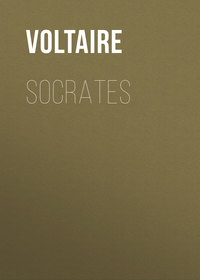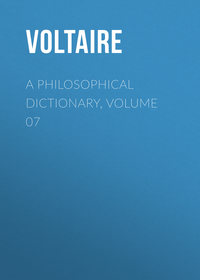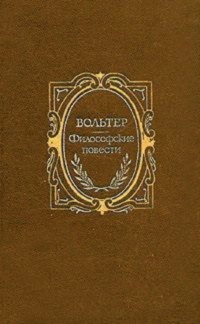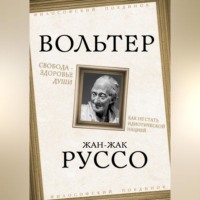
A Philosophical Dictionary, Volume 10
I do not pretend to speak of the heresy of which Pope John XXII. was accused, who pretended that saints will not enjoy beatific vision until after the last judgment. I give up this vision. My subject is the innumerable multitude of visions with which so many holy personages have been favored or tormented; which so many idiots are believed to have seen; with which so many knavish men and women have duped the world, either to get the reputation of being favored by heaven, which is very flattering, or to gain money, which is still more so to rogues in general.
Calmet and Langlet have made ample collections of these visions. The most interesting in my opinion is the one which has produced the greatest effects, since it has tended to reform three parts of the Swiss – that of the young Jacobin Yetzer, with which I have already amused my dear reader. This Yetzer, as you know, saw the Holy Virgin and St. Barbara several times, who informed him of the marks of Jesus Christ. You are not ignorant of how he received, from a Jacobin confessor, a host powdered with arsenic, and how the bishop of Lausanne would have had him burned for complaining that he was poisoned. You have seen, that these abominations were one of the causes of the misfortune which happened to the Bernese, of ceasing to be Catholic, Apostolical, and Roman.
I am sorry that I have no visions of this consequence to tell you of. Yet you will confess, that the vision of the reverend father Cordeliers of Orleans, in 1534, approaches the nearest to it, though still very distant. The criminal process which it occasioned is still in manuscript in the library of the king of France, No. 1770.
The illustrious house of St. Memin did great good to the convent of the Cordeliers, and had their vault in the church. The wife of a lord of St. Memin, provost of Orleans, being dead, her husband, believing that his ancestors had sufficiently impoverished themselves by giving to the monks, gave the brothers a present which did not appear to them considerable enough. These good Franciscans conceived a plan for disinterring the deceased, to force the widower to have her buried again in their holy ground, and to pay them better. The project was not clever, for the lord of St. Memin would not have failed to bury her elsewhere. But folly often mixes with knavery.
At first, the soul of the lady of St. Memin appeared only to two brothers. She said to them: "I am damned, like Judas, because my husband has not given sufficient." The two knaves who related these words perceived not, that they must do more harm to the convent than good. The aim of the convent was to extort money from the lord of St. Memin, for the repose of his wife's soul. Now, if Madame de St. Memin was damned, all the money in the world could not save her. They got no more; the Cordeliers lost their labor.
At this time there was very little good sense in France: the nation had been brutalized by the invasion of the Franks, and afterwards by the invasion of scholastic theology; but in Orleans there were some persons who reasoned. If the Great Being permitted the soul of Madame de St. Memin to appear to two Franciscans, it was not natural, they thought, for this soul to declare itself damned like Judas. This comparison appeared to them to be unnatural. This lady had not sold our Lord Jesus Christ for thirty deniers; she was not hanged; her intestines had not obtruded themselves; and there was not the slightest pretext for comparing her to Judas.
This caused suspicion; and the rumor was still greater in Orleans, because there were already heretics there who believed not in certain visions, and who, in admitting absurd principles, did not always fail to draw good conclusions. The Cordeliers, therefore, changed their battery, and put the lady in purgatory.
She therefore appeared again, and declared that purgatory was her lot; but she demanded to be disinterred. It was not the custom to disinter those in purgatory; but they hoped that M. de St. Memin would prevent this extraordinary affront, by giving money. This demand of being thrown out of the church augmented the suspicions. It was well known, that souls often appeared, but they never demanded to be disinterred.
From this time the soul spoke no more, but it haunted everybody in the convent and church. The brother Cordeliers exorcised it. Brother Peter of Arras adopted a very awkward manner of conjuring it. He said to it: "If thou art the soul of the late Madame de St. Memin, strike four knocks;" and the four knocks were struck. "If thou are damned, strike six knocks;" and the six knocks were struck. "If thou art still tormented in hell, because thy body is buried in holy ground, knock six more times;" and the other six knocks were heard still more distinctly. "If we disinter thy body, and cease praying to God for thee, wilt thou be the less damned? Strike five knocks to certify it to us;" and the soul certified it by five knocks.
This interrogation of the soul, made by Peter of Arras, was signed by twenty-two Cordeliers, at the head of which was the reverend father provincial. This father provincial the next day asked it the same questions, and received the same answers.
It will be said, that the soul having declared that it was in purgatory, the Cordeliers should not have supposed that it was in hell; but it is not my fault if theologians contradict one another.
The lord of St. Memin presented a request to the king against the father Cordeliers. They presented a request on their sides; the king appointed judges, at the head of whom was Adrian Fumée, master of requests.
The procureur-general of the commission required that the said Cordeliers should be burned, but the sentence only condemned them to make the "amende honorable" with a torch in their bosom, and to be banished from the kingdom. This sentence is of February 18, 1535.
After such a vision, it is useless to relate any others: they are all a species either of knavery or folly. Visions of the first kind are under the province of justice; those of the second are either visions of diseased fools, or of fools in good health. The first belong to medicine, the second to Bedlam.
VISION OF CONSTANTINE
Grave theologians have not failed to allege a specious reason to maintain the truth of the appearance of the cross in heaven; but we are going to show that these arguments are not sufficiently convincing to exclude doubt; the evidences which they quote being neither persuasive nor according with one another.
First, they produce no witnesses but Christians, the deposition of whom may be suspected in the treatment of a fact which tended to prove the divinity of their religion. How is it that no Pagan author has made mention of this miracle, which was seen equally by all the army of Constantine? That Zosimus, who seems to have endeavored to diminish the glory of Constantine, has said nothing of it, is not surprising; but the silence appears very strange in the author of the panegyric of Constantine, pronounced in his presence at Trier; in which oration the panegyrist expresses himself in magnificent terms on all the war against Maxentius, whom this emperor had conquered.
Another orator, who, in his panegyric, treats so eloquently of the war against Maxentius, of the clemency which Constantine showed after the victory, and of the deliverance of Rome, says not a word on this apparition; while he assures us, that celestial armies were seen by all the Gauls, which armies, it was pretended, were sent to aid Constantine.
This surprising vision has not only been unknown to Pagan authors, but to three Christian writers, who had the finest occasion to speak of them. Optatianus Porphyrius mentions more than once the monogram of Christ, which he calls the celestial sign, in the panegyric of Constantine which he wrote in Latin verse, but not a word on the appearance of the cross in the sky.
Lactantius says nothing of it in his treatise on the "Death of Persecutors," which he composed towards the year 314, two years after the vision of which we speak; yet he must have been perfectly informed of all that regards Constantine, having been tutor to Crispus, the son of this prince. He merely relates, that Constantine was commanded, in a dream, to put the divine image of the cross on the bucklers of his soldiers, and to give up war: but in relating a dream, the truth of which had no other support than the evidence of the emperor, he passes, in silence over a prodigy to which all the army were witnesses.
Further, Eusebius of Cæsarea himself, who has given the example to all other Christian historians on the subject, speaks not of this wonder, in the whole course of his "Ecclesiastical History," though he enlarges much on the exploits of Constantine against Maxentius. It is only in his life of this emperor that he expresses himself in these terms: "Constantine resolved to adore the god of Constantius; his father implored the protection of this god against Maxentius. Whilst he was praying, he had a wonderful vision, which would appear incredible, if related by another; but since the victorious emperor has himself related it to us, who wrote this history; and that, after having been long known to this prince, and enjoying a share in his good graces, the emperor confirming what he said by oath – who could doubt it? particularly since the event has confirmed the truth of it.
"He affirmed, that in the afternoon, when the sun set, he saw a luminous cross above it, with this inscription in Greek – 'By this sign, conquer:' that this appearance astonished him extremely, as well as all the soldiers who followed him, who were witnesses of the miracle; that while his mind was fully occupied with this vision, and he sought to penetrate the sense of it, the night being come, Jesus Christ appeared to him during his sleep, with the same sign which He had shown to him in the air in the day-time, and commanded him to make a standard of the same form, and to bear it in his battles, to secure him from danger. Constantine, rising at break of day, related to his friends the vision which he had beheld; and, sending for goldsmiths and lapidaries, he sat in the midst of them, explained to them the figure of the sign which he had seen, and commanded them to make a similar one of gold and jewels; and we remember having sometimes seen it."
Eusebius afterwards adds, that Constantine, astonished at so admirable a vision, sent for Christian priests; and that, instructed by them, he applied himself to reading our sacred books, and concluded that he ought to adore with a profound respect the God who appeared to him.
How can we conceive that so admirable a vision, seen by so many millions of people, and so calculated to justify the truth of the Christian religion, could be unknown to Eusebius, an historian so careful in seeking all that could contribute to do honor to Christianity, as even to quote profane monuments falsely, as we have seen in the article on "Eclipse?" And how can we persuade ourselves that he was not informed of it, until several years after, by the sole evidence of Constantine? Were there no Christians in the army, who publicly made a glory of having seen such a prodigy? Had they so little interest in their cause as to keep silence on so great a miracle? Ought we to be astonished, after that, that Gelasius, one of the successors of Eusebius, in the siege of Cæsarea in the fifth century, has said that many people suspected that it was only a fable, invented in favor of the Christian religion?
This suspicion will become much stronger, if we take notice how little the witnesses agree on the circumstances of this marvellous appearance. Almost all affirm, that the cross was seen by Constantine and all his army; and Gelasius speaks of Constantine alone. They differ on the time of the vision. Philostorgius, in his "Ecclesiastical History," of which Photius has preserved us the extract, says, that it was when Constantine gained the victory over Maxentius; others pretend that it was before, when Constantine was making preparations for attacking the tyrant, and was on his march with his army. Arthemius, quoted by Metaphrastus and Surius, mentions the 20th of October, and says that it was at noon; others speak of the afternoon at sunset.
Authors do not agree better even on the vision: the greatest number acknowledged but one, and that in a dream. There is only Eusebius, followed by Philostorgius and Socrates, who speaks of two; the one that Constantine saw in the day-time, and the other which he saw in a dream, tending to confirm the first. Nicephorus Callistus reckons three.
The inscription offers new differences: Eusebius says that it was in Greek characters, while others do not speak of it. According to Philostorgius and Nicephorus, it was in Latin characters; others say nothing about it, and seem by their relation to suppose that the characters were Greek. Philostorgius affirms, that the inscription was formed by an assemblage of stars; Arthemius says that the letters were golden. The author quoted by Photius, represents them as composed of the same luminous matter as the cross; and according to Sosomenes, it had no inscription, and they were angels who said to Constantine: "By this sign, gain the victory."
Finally, the relation of historians is opposed on the consequences of this vision. If we take that of Eusebius, Constantine, aided by God, easily gained the victory over Maxentius; but according to Lactantius, the victory was much disputed. He even says that the troops of Maxentius had some advantage, before Constantine made his army approach the gates of Rome. If we may believe Eusebius and Sosomenes, from this epoch Constantine was always victorious, and opposed the salutary sign of the cross to his enemies, as an impenetrable rampart. However, a Christian author, of whom M. de Valois has collected some fragments, at the end of Ammianus Marcellinus – relates, that in the two battles given to Licinius by Constantine, the victory was doubtful, and that Constantine was even slightly wounded in the thigh; and Nicephorus says, that after the first apparition, he twice combated the Byzantines, without opposing the cross to them, and would not even have remembered it, if he had not lost nine thousand men, and had the same vision twice more. In the first, the stars were so arranged that they formed these words of a psalm: "Call on me in the day of trouble: I will deliver thee, and thou shalt glorify me;" and the last, much clearer and more brilliant still, bore: "By this sign, thou shalt vanquish all thy enemies."
Philostorgius affirms, that the vision of the cross, and the victory gained over Maxentius, determined Constantine to embrace the Christian faith; but Rufinus, who has translated the "Ecclesiastical History" of Eusebius into Latin, says that he already favored Christianity, and honored the true God. It is however known, that he did not receive baptism until a few days before his death, as is expressly said by Philostorgius, St. Athanasius, St. Ambrose, St. Jerome, Socrates, Theodoret, and the author of the Chronicle of Alexandria. This custom, then common, was founded on the belief that, baptism effacing all the sins of him who received it, he died certain of his salvation.
We might confine ourselves to these general reflections, but by superabundance of right we will discuss the authority of Eusebius, as an historian, and that of Constantine and Arthemius, as ocular witnesses.
As to Arthemius, we think that he ought not to be placed in the rank of ocular witnesses; his discourse being founded only on his "Acts," related by Metaphrastus, a fabulous author: "Acts" which Baronius pretends it was wrong to impeach, at the same time that he confesses that they are interpolated.
As to the speech of Constantine, related by Eusebius, it is indisputably an astonishing thing, that this emperor feared that he should not be believed unless he made oath; and that Eusebius has not supported his evidence by that of any of the officers or soldiers of the army. But without here adopting the opinion of some scholars, who doubt whether Eusebius is the author of the life of Constantine, is he not an author who, in this work, bears throughout the character of a panegyrist, rather than that of a historian? Is he not a writer who has carefully suppressed all which could be disadvantageous to his hero? In a word, does he not show his partiality, when he says, in his "Ecclesiastical History," speaking of Maxentius, that having usurped the sovereign power at Rome, to flatter the people he feigned at first to profess the Christian religion? As if it was impossible for Constantine to make use of such a feint, and to pretend this vision, just as Licinius, some time after, to encourage his soldiers against Maximin, pretended that an angel in a dream had dictated a prayer to him, which he must repeat with his army.
How could Eusebius really have the effrontery to call a prince a Christian who caused the temple of Concord to be rebuilt at his own expense, as is proved by an inscription, which was read in the time of Lelio Geraldi, in the temple of Latran? A prince who caused his son Crispus, already honored with the title of Cæsar, to perish on a slight suspicion of having commerce with Fausta, his stepmother; who caused this same Fausta, to whom he was indebted for the preservation of his life, to be suffocated in an overheated bath; who caused the emperor Maximian Hercules, his adopted father, to be strangled; who took away the life of the young Licinius, his nephew, who had already displayed very good qualities; and, in short, who dishonored himself by so many murders, that the consul Ablavius called his times Neronian? We might add, that much dependence should not be placed on the oath of Constantine, since he had not the least scruple in perjuring himself, by causing Licinius to be strangled, to whom he had promised his life on oath. Eusebius passes in silence over all the actions of Constantine which are related by Eutropius, Zosimus, Orosius, St. Jerome, and Aurelius Victor.
After this, have we not reason to conclude that the pretended appearance of the cross in the sky is only a fraud which Constantine imagined to favor the success of his ambitious enterprises? The medals of this prince and of his family, which are found in Banduri, and in the work entitled, "Numismata Imperatorum Romanorum"; the triumphal arch of which Baronius speaks, in the inscription of which the senate and the Roman people said that Constantine, by the direction of the Divinity, had rid the republic of the tyrant Maxentius, and of all his faction; finally, the statue which Constantine himself caused to be erected at Rome, holding a lance terminating in the form of a cross, with this inscription – as related by Eusebius: "By this saving sign, I have delivered your city from the yoke of tyranny" – all this, I say, only proves the immoderate pride of this artificial prince, who would everywhere spread the noise of his pretended dream, and perpetuate the recollection of it.
Yet, to excuse Eusebius, we must compare him to a bishop of the seventeenth century, whom La Bruyère hesitated not to call a father of the Church. Bossuet, at the same time that he fell so unmercifully on the visions of the elegant and sensible Fénelon, commented himself, in the funeral oration of Anne of Gonzaga of Cleves, on the two visions which worked the conversion of the Princess Palatine. It was an admirable dream, says this prelate; she thought that, walking alone in a forest, she met with a blind man in a small cell. She comprehended that a sense is wanting to the incredulous as well as to the blind; and at the same time, in the midst of so mysterious a dream, she applied the fine comparison of the blind man to the truths of religion and of the other life.
In the second vision, God continued to instruct her, as He did Joseph and Solomon; and during the drowsiness which the trouble caused her, He put this parable into her mind, so similar to that in the gospel: She saw that appear which Jesus Christ has not disdained to give us as an image of His tenderness – a hen become a mother, anxious round the little ones which she conducted. One of them having strayed, our invalid saw it swallowed by a hungry dog. She ran and tore the innocent animal away from him. At the same time, a voice cried from the other side that she must give it back to the ravisher. "No," said she, "I will never give it back." At this moment she awakened, and the explanation of the figure which had been shown to her presented itself to her mind in an instant.
VOWS
To make a vow for life, is to make oneself a slave. How can this worst of all slavery be allowed in a country in which slavery is proscribed? To promise to God by an oath, that from the age of fifteen until death we will be a Jesuit, Jacobin, or Capuchin, is to affirm that we will always think like a Capuchin, a Jacobin, or a Jesuit. It is very pleasant to promise, for a whole life, that which no man can certainly insure from night to morning!
How can governments have been such enemies to themselves, and so absurd, as to authorize citizens to alienate their liberty at an age when they are not allowed to dispose of the least portion of their fortunes? How, being convinced of the extent of this stupidity, have not the whole of the magistracy united to put an end to it?
Is it not alarming to reflect that there are more monks than soldiers? Is it possible not to be affected by the discovery of the secrets of cloisters; the turpitudes, the horrors, and the torments to which so many unhappy children are subjected, who detest the state which they have been forced to adopt, when they become men, and who beat with useless despair the chains which their weakness has imposed upon them?
I knew a young man whose parents engaged to make a Capuchin of him at fifteen years and a half old, when he desperately loved a girl very nearly of his own age. As soon as the unhappy youth had made his vow to St. Francis, the devil reminded him of the vows which he had made to his mistress, to whom he had signed a promise of marriage. At last, the devil being stronger than St. Francis, the young Capuchin left his cloister, repaired to the house of his mistress, and was told that she had entered a convent and made profession.
He flew to the convent, and asked to see her, when he was told that she had died of grief. This news deprived him of all sense, and he fell to the ground nearly lifeless. He was immediately transported to a neighboring monastery, not to afford him the necessary medical aid, but in order to procure him the blessing of extreme unction before his death, which infallibly saves the soul.
The house to which the poor fainting boy was carried, happened to be a convent of Capuchins, who charitably let him remain at the door for three hours; but at last he was recognized by one of the venerable brothers, who had seen him in the monastery to which he belonged. On this discovery, he was carried into a cell, and attention paid to recover him, in order that he might expiate, by a salutary penitence, the errors of which he had been guilty.
As soon as he had recovered strength, he was conducted, well bound, to his convent, and the following is precisely the manner in which he was treated. In the first place he was placed in a dungeon under ground, at the bottom of which was an enormous stone, to which a chain of iron was attached. To this chain he was fastened by one leg, and near him was placed a loaf of barley bread and a jug of water; after which they closed the entrance of the dungeon with a large block of stone, which covered the opening by which they had descended.
At the end of three days they withdrew him from the dungeon, in order to bring him before the criminal court of the Capuchins. They wished to know if he had any accomplices in his flight, and to oblige him to confess, applied the mode of torture employed in the convent. This preparatory torture was inflicted by cords, which bound the limbs of the patient, and made him endure a sort of rack.
After having undergone these torments, he was condemned to be imprisoned for two years in his cell, from which he was to be brought out thrice a week, in order to receive upon his naked body the discipline with iron chains.
For six months his constitution endured this punishment, from which he was at length so fortunate as to escape in consequence of a quarrel among the Capuchins, who fought with one another, and allowed the prisoner to escape during the fray.
After hiding himself for some hours, he ventured to go abroad at the decline of day, almost worn out by hunger, and scarcely able to support himself. A passing Samaritan took pity upon the poor, famished spectre, conducted him to his house, and gave him assistance. The unhappy youth himself related to me his story in the presence of his liberator. Behold here the consequence of vows!







